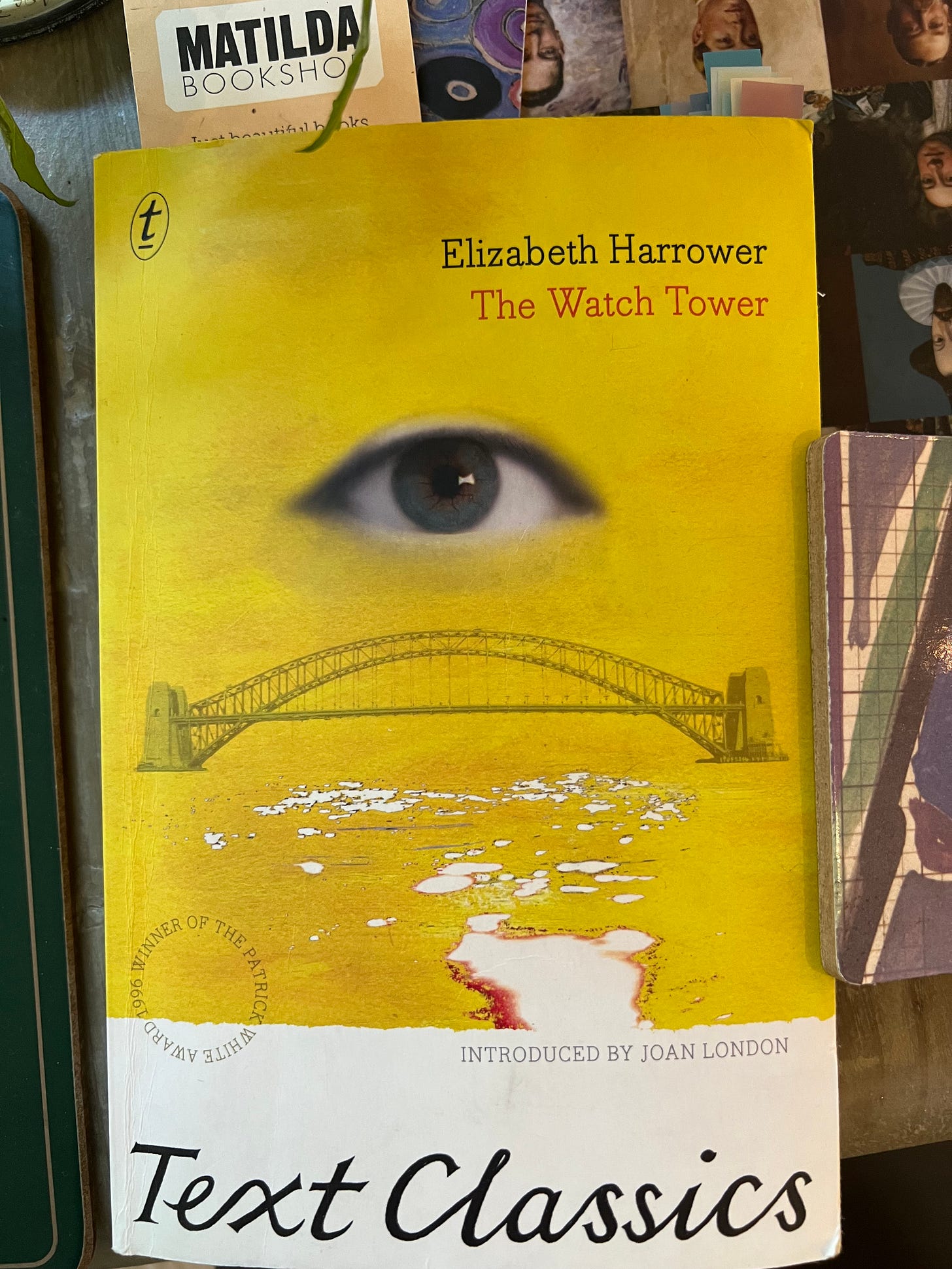I’m a playwright who writes about twentieth-century novels and other literary/theatrical matters. Subscribe to The Essence of the Thing with your email address to have my newsletter delivered to your inbox. It’s free.
Hello,
This week I discuss Elizabeth Harrower’s The Watch Tower – and ‘Bluebeard’.
Thanks for subscribing. Tell anyone you think who may be interested that they can subscribe for free with their email address.
Sam
It’s no surprise that Charles Perrault’s fairy tale ‘Bluebeard’ (1697) – ‘He was the one who had rooms full of murdered wives!’ as a character puts it in Elizabeth Harrower’s The Watch Tower – is so often an intertext to works by women writers.1
Jealousy, the secrets behind the locked door, marriage as murder both literal and metaphorical – these are perennial themes, and although Bluebeard gets his comeuppance, Perrault’s moral, with its patriarchal anxieties about the perils of pesky female curiosity, has, down the centuries, cried out for feminist reckonings:
The feminine sex will deny it, of course, / But the pleasure you wanted, once taken, is lost, / And the knowledge you looked for is not worth the cost.2
No one outside of Margaret Atwood’s Gilead would now read ‘Bluebeard’ this way – though she or he may wonder about the mental health of a husband who tells his new bride she may visit every room in the fine house he owns, except one, to which the bastard still gives her the key.
This is a man aroused by a woman’s confusion (she is at once repulsed and beguiled by his blue beard), a psychopath who takes pleasure in tempting her towards his bloody crimes. It’s a misogynist, and narratively compelling, kind of psychological torture, and so he is the focus of fascination, fury and retaliation in works from Charlotte Brontë’s Jane Eyre (Jane likens Rochester’s Thornfield Hall to ‘Bluebeard’s castle’) to Jane Campion’s The Piano; from Atwood’s The Robber Bride and Daphne du Maurier’s Rebecca, to Angela Carter’s The Bloody Chamber.3 In Perrault, the bride’s sister waits and watches on a tower for their brothers, who arrive on horseback to save the bride; Carter, who puts the tale into the bride’s mouth, makes her saviour her mother:
On her eighteenth birthday, my mother had disposed of a man-eating tiger that had ravaged the villages in the hills north of Hanoi. Now, without a moment’s hesitation, she raised my father’s gun, took aim and put a single, irreproachable bullet through my husband’s head.4
Harrower (1928-2020) was an Australian writer who had four novels published between 1957 and 1966, then in 1971 decided not to publish her fifth, In Certain Circles, and seemed to put an end to her career. Perhaps she doubted her formidable talent. Perhaps she thought she’d said everything she wanted to say: she told an interviewer she was ‘very good at closing doors and ending things’, and spoke of ‘dead novels out in the world that don’t need to be written’.5 In 2014 the Melbourne-based publishing house Text persuaded her to let them publish In Certain Circles.
The story of Harrower’s fourth novel The Watch Tower (reissued by Text in 2012) is simple. In Sydney during World War II, Laura and her younger sister Clare are abandoned by their outstandingly selfish mother after their father dies. Laura’s boss Felix Shaw, the heat of whose eyes ‘half-hypnotised her’, whose tone ‘was excessive in some way that was disturbing, almost disagreeable to her’, proposes a way to ‘take care of [their] little problem’:
I think you’d better just marry me, and both of you come to live in the new house. I’ll fix everything.
After years of ‘solitary confinement’ with their mother, the sisters’ lives change. Felix takes Laura to restaurants, and she rides in cars instead of trams; he takes them both to ‘plays, picnics, events’. Laura does not know Felix ‘at all’ but seizes the security he offers and assumes herself in love. His beautiful colonial house in Neutral Bay, with its Edenic fruit trees, is ‘the loveliest’ she’s seen:
Almost, she revered the house. Almost, she loved and feared it with a heavy doting love.
Clare, meanwhile, is more discerning. She waits. She watches from the windows, with their views of the harbour: ‘[a]ll windows were part of the look-out tower’. She reads Chekhov, Dostoevsky, Tolstoy. As ‘the only Russian in Sydney’, she yearns for ‘darlings, angels, sweethearts, truthful, laughing ones’, for ‘beauty and terror and so much more than we know’.
A husband and his fine house; a new wife who barely knows him and who is at once uneasy about and hypnotised by his appearance; a sister at a metaphorical tower waiting for a saviour: the allusions to Perrault are obvious, and all this is before Felix explicitly compares himself to Bluebeard. He shows Laura and Clare a gift he’s received, a china figure
in the act of drawing a long assassin’s knife from the low-slung girdle at his waist.
‘Bluebeard!’ Felix cried. ‘Me! […] He knew how to treat his women! He knew the stuff to give ’em!’
Evidently, Felix is not the sisters’ liberator but their gaoler, and what follows is a gripping psychodrama, in which Felix – a sociable and garrulous larrikin who has no friends, a swindler perpetually swindled by others, a coward with ‘a talent for murder that he had not yet tapped’ – tries to make something of his own life, and control the women’s. The story climaxes with a terrifying battle of wills over the soul of an outsider; its twists and turns are surprising to the characters and to us.
Laura and Clare’s prospects are restricted by their pre-second-wave society, and Felix is an old-fashioned misogynist. Extraordinarily, however, what Harrower writes about here does not belong only to yesterday (as, arguably, ‘Bluebeard’ does). The Watch Tower is a timeless novel about power, an astounding dissection of the human capacity, need, for psychological warfare. Anyone who has been in a relationship, had a friend or colleague, felt jealous of that friend or envious of that friend’s friend; anyone who has felt vulnerable; anyone who has been bullied or been a bully; and particularly anyone who has grasped for security then realised the cost at which it has come, will find uncomfortable truths on every page.
And the characterisations! We aren’t often taken inside Felix: his maliciousness, silences, fickleness, and what we would now call his grooming, passive aggressiveness and gaslighting, all speak for themselves. The descriptions of him are comic and macabre. He has ‘a jolly face like a butcher at a trade picnic’. He is ‘a smiling tiger’. He can ‘only find pleasure in tearing people’s wings off’. He feels ‘no shame at all trotting out old Method Thirty-Two for crushing people’. A fairy-tale Bluebeard indeed, a grotesque from the Grand Guignol; in Helen Garner’s words, ‘one of literature’s most ferociously realised nasty pieces of work’.6
As for the bride and her sister, early on, Laura and Clare listen to a song on the wireless, ‘The Bluebird of Happiness’:
Be like I, hold your head up high, […] / just remember this, life is no abyss / Somewhere there’s a bluebird of happiness.
I think the rich consonance here – Bluebeard and Bluebird – is deliberate; and ‘bluebird’ recalls, firstly, Jane Eyre standing up to her Bluebeard:
‘I am no bird; and no net ensnares me: I am a free human being with an independent will; which I now exert to leave you’;
and secondly, Maurice Maeterlinck’s play The Blue Bird in which, like Clare, the young protagonists have a sense of beauty elsewhere.7
The sisters are ensnared in their Bluebeard’s net, Laura particularly. She colludes with herself and her husband: she is a troublingly recognisable person, the type who, for the sake of a wretched sort of peace, endures humiliations and excuses obnoxious behaviour.
But Clare could, possibly, free herself and find the bluebird. From the moment we are told that her heart is wrung by two untalented actors she sees in a play – ‘It was unbearable. They must never know’ – I loved her. Whether or not The Watch Tower is a feminist answer to Perrault I will leave to others to argue; but it is certainly Clare who provides the relief from the lurid masculinist melodrama of Felix. She hungers for goodness, truth, blessing, independence. She believes in passive resistance. She understands that what most enrages Bluebeards is that they can’t ‘get within miles’ of other people’s minds. She gives the novel its poetry and hope, its humanity.
I can’t say The Watch Tower is as good as Jane Eyre and The Bloody Chamber, but not much is – and these are pointless comparisons. I can say that I think Angela Carter would have admired Harrower: she certainly admired another Australian writer who admired Harrower, Christina Stead. Stead wrote to Harrower, ‘You have a remarkable, sober acerbity […] and the fragrance and nuttiness of the kernel, with the nutshell dispensed with …’ –
at which point I interrupt myself to say: fucking hell, how magnificent is that!8 Writers: surely ‘the fragrance and nuttiness of the kernel, with the nutshell dispensed with’ is what we search for when we write?! (The challenge is dispensing with the kernel, I think.) Read For Love Alone, read The Man Who Loved Children (another Bluebeard story), read Christina Stead!
I can also say that I think it’s much better than The Robber Bride (which I found turgid), at least as good as The Piano, and better than (though not as enjoyable as) Rebecca. And its Bluebeard figure is at least as compelling as Charlotte Brontë’s, and more compelling than Perrault’s.
A masterpiece, then, and I hope that it’s true, in the words of Garner again, that in Australia, at least, it and Harrower have come ‘rampaging back from decades of disgraceful neglect’.9
Elizabeth Harrower, The Watch Tower (Sydney: Macmillan, 1966; repr. Melbourne: Text Publishing, 2012), p. 72. Subsequent quotations are from pp. 28-9, 50, 57-9, 63-4, 67, 70-2, 81, 108, 147-8, 153, 179, 273, 287, 301.
Charles Perrault, ‘Bluebeard’, in The Complete Fairy Tales, trans. by Christopher Betts (Oxford: Oxford University Press, 2009), pp. 104-14 (p. 113).
Charlotte Brontë, Jane Eyre (1847; repr. Oxford: Oxford University Press, 1986), p. 108.
Angela Carter, ‘The Bloody Chamber’, in The Bloody Chamber (London: Victor Gollancz, 1979; repr. London: Vintage, 2006), p. 41.
Harrower, quoted in James Woods, ‘No Time for Lies: Rediscovering Elizabeth Harrower’, New Yorker, 20 October 2014 https://www.newyorker.com/magazine/2014/10/20/time-lies [accessed 10 June 2023].
Helen Garner, quoted at https://www.textpublishing.com.au/books/the-watch-tower-hardback-anniversary-edition [accessed 10 June 2023].
Brontë, p. 256.
Christina Stead (6 November 1969), quoted in Brigid Rooney and Fiona Morrison, ‘Discovering the long prospect: Elizabeth Harrower and Christina Stead’, Southerly, 2 December 2015 https://southerlylitmag.com.au/special-post-discovering-the-long-prospect-elizabeth-harrower-and-christina-stead/ [accessed 10 June 2023].
Garner, op. cit.





